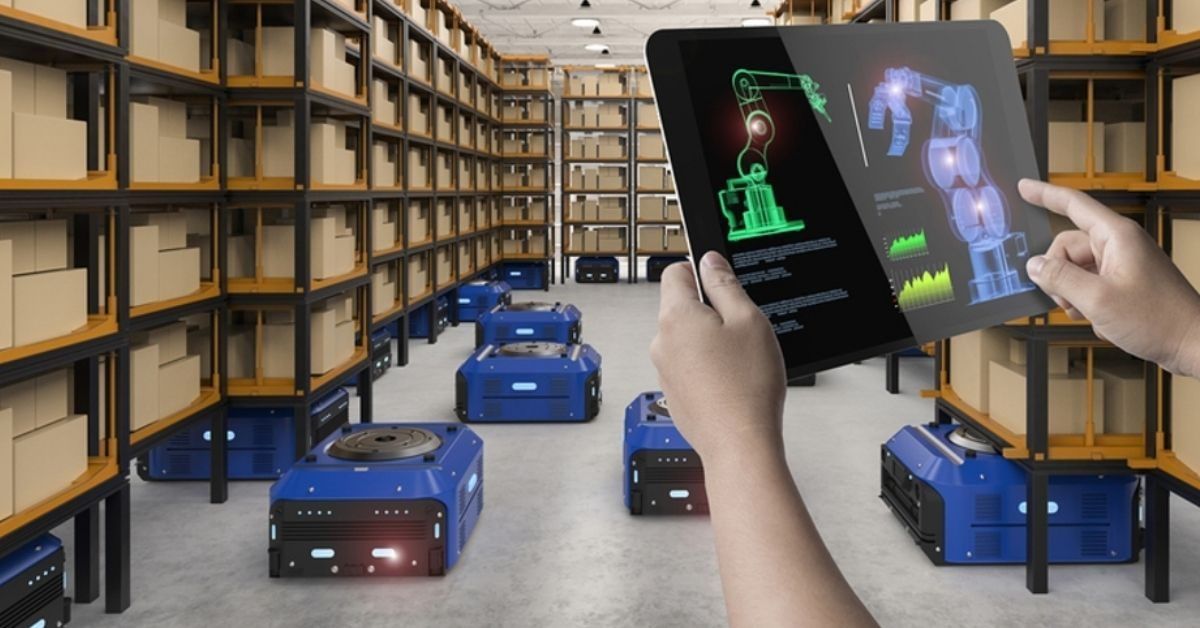
Logistics play a crucial role in the economic growth of a nation. With significant advancements in technology, the logistics industry has witnessed impressive growth over the past few years. The pandemic compelled industries worldwide to embrace technology at a rapid pace and a similar trend was observed in the logistics space as well. Automation is one of the key technologies that has been instrumental in improving efficiencies and triggering growth.
The Indian logistics automation market is expected to reach INR 145.10 Bn by the end of 2027, expanding at a CAGR of 13.28% during the 2022 – 2026 period. Going forward, automation will revolutionize the logistics industry with processes being carried more precisely and efficiently. As logistics processes become more efficient, its impact can be seen across industries.
The rise of logistics automation is positively influencing retail, ecommerce and manufacturing industries among others. Let’s explore how automation logistics is driving growth in these key sectors.
Retail and ecommerce industry
The retail sector is continuously advancing and this can be partly attributed to logistics automation. Logistics automation helps retailers achieve timely deliveries, operational transparency and omni-channel distribution. From order sorting to route optimization and final delivery, logistics automation has helped retailers improve their customer service to a significant extent. In addition, logistics automation enables retailers to devise appropriate fulfillment strategies.
The demand for express delivery services in the ecommerce industry has also propelled the growth of logistics automation. Automation is a critical component facilitating last mile delivery for ecommerce brands.
Logistics software has forecasting capabilities which helps retailers gain crucial insights into the consumer behavior and order patterns. Such forecasting capabilities are critical to align order fulfillment strategies in line with the evolving consumer demands. It helps retailers set up fulfillment centers in locations where there is an increased demand.
Healthcare and pharmaceuticals industry
The healthcare industry is going through a logistics transformation of its own. Even a minor error in handling shipments could understandably lead to disastrous consequences in the healthcare industry. Logistics automation has been instrumental in bridging gaps and driving operational efficiencies in the criticare segment. Automating shipping processes eliminates errors, ensuring healthcare products reach the right place at the right time.
Automation is the key to shortening turnaround times which is a critical issue prevalent in the healthcare industry. Logistics automation enables cost-effective, real-time tracking of inventory. Automated alerts for drug expiry and last mile connectivity across the healthcare supply chain are key benefits driving growth in the healthcare and pharmaceutical industry.
Manufacturing industry
Improper information flow, failure to detect damaged products, uncertain inventory status are some of the challenges faced by the manufacturing industry. Logistics automation enables perfectly coordinated and optimized processes within the manufacturing industry. The strategic addition of robotics to manage in-factory logistics can redefine the production cycle, subsequently resulting in better turnaround times. Logistics automation has enabled manufacturing industries to achieve the highest production efficiency, avoid downtimes and increase throughput speed.
FMCG industry
Warehousing is a critical element of logistics and management of produced goods in the FMCG industry. Automation technology has been pivotal to optimizing warehousing operations for FMCG industries. Warehouse Management Systems in conjunction with automated guided vehicles can increase efficiency and reduce expenses. Minimizing physical contact during storage and retrieval of products translates to increased safety. Automation in logistics and supply chain helps in doing this and more as listed below –
- Sustainable warehouses: The warehouse is a pivotal aspect of supply chains and in order to maximize the operational of a warehouse, automated solutions can be put in order. Deployment of robots, usage of bar code & RFID, automated storage & retrieval systems (ASRS), innovative storage solutions (like vertical storages), Warehouse Management Systems (WMS) and AI algorithms, increase energy efficiencies, inventory control and sustainable value system
- “Lights-out” approach: As automation systems can function independently, lights do not need to be turned on for a good part of time, except for some maintenance work, etc…This markedly reduces energy consumption and thereby costs
- Optimization of Fleet & Transport: WMS, works hard. It aids in optimizing various warehousing functions such as order grouping and route planning, thereby guaranteeing efficiency in fleet management and reduction of overall carbon emissions which is a huge challenge in logistics supply chain
Automation reduces overheads and increases each worker’s productivity without expanding headcount. Costs associated with labor, equipment and maintenance can be significantly reduced with automation. It also facilitates optimum utilization of warehouse space, less worker strain and fatigue, fewer injuries and fewer shipping mistakes. Automation plays a key role in keeping warehouses at optimal productivity. Logistics automation has been a boon for industries given its productivity benefits. Logistics as an industry has been slow to adopt technology as unorganized players always preferred labor over tech-enabled solutions. However, the pandemic accelerated tech adoption in the industry and subsequently retail, ecommerce, criticare and manufacturing industries that are heavily reliant on logistics have hugely benefited from this tech transformation. Logistics companies need to automate their processes so businesses can capitalize on the latest technology to improve their performance and bottom lines. The integration of automation with advanced technologies such as Artificial Intelligence and GPS will further propel growth across industries that thrive on efficient logistics management.









